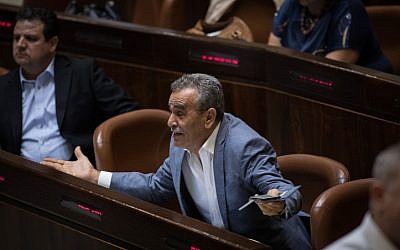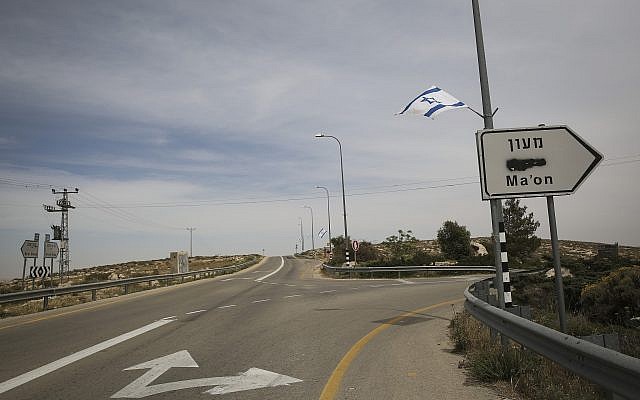Watchdog joins other US Jewish groups in concern over Jewish state’s treatment of minorities, but backs law’s determination of state symbols

The Anti-Defamation League on Thursday added its voice to a growing chorus of disapproval over Israel’s controversial Jewish nation-state law, saying the new legislation raises concerns about Israel’s commitment to its democratic nature, and calling for the law not to be used to discriminate against minorities.
“We are troubled by the fact that the law, which celebrates the fundamental Jewish nature of the state, raises significant questions about the government’s long-term commitment to its pluralistic identity and democratic nature,” said Jonathan Greenblatt, CEO, and Carole Nuriel, Israel director of the watchdog group, in a statement.
“Israel has an obligation to ensure that, in practice, this Basic Law is not used to discriminate against minorities, particularly its Arab citizens, and that the state maintains its commitment to improve relations between Jews in Israel and those around the world,” they said.

However the organization was clear in its support of certain sections of the legislation, including the determination of state symbols and the encouragement of Jewish immigration.
On Wednesday night, the Union for Reform Judaism and American Jewish Committee quickly denounced the contentious nation-state bill, claiming the legislation undermines Israel’s democratic foundation.
Shortly after Knesset lawmakers approved the bill overnight Wednesday, which, for the first time, enshrines Israel as “the national home of the Jewish people” in its quasi-constitutional Basic Laws, American Jewish Committee and Reform movement leaders castigated the measure as codifying a system of discrimination against Arabs and other minorities.
“This is a sad and unnecessary day for Israeli democracy,” said Rick Jacobs, president of the Union for Reform Judaism, which represents the largest Jewish denomination in the United States. “The damage that will be done by this new Nation-State law to the legitimacy of the Zionist vision and to the values of the state of Israel as a democratic — and Jewish — nation is enormous.”
The nation-state bill provoked deep division in Israel, with proponents arguing it equalized Jewish and democratic values while critics saw it as prejudicial — granting Israel’s non-Jewish citizens with a diminished status.

Early on Thursday morning, Joint (Arab) List MK Jamal Zahalka tore up a text of the bill to shreds from his Knesset podium in protest.
“I declare with astonishment and sorrow the death of democracy,” said his fellow party member Ahmad Tibi. “The funeral will take place today in the plenum.”
The law also declares Jerusalem as the capital of Israel, sets the Hebrew calendar as the state’s official calendar, and recognizes Jewish holidays.
One clause downgrades the Arabic language from official to “special” standing. Despite the text cryptically stating that provision “does not harm the status given to the Arabic language before this law came into effect,” one US Jewish group cast that clause as harmful.

The American Jewish Committee put out a statement saying it was “deeply disappointed” in the legislation, and cited that section of the bill as a key reason why.
The Jewish advocacy group said that change “not only directly affects the 21 percent of Israel’s citizens who comprise the country’s largest minority, but it also would appear to work against the government’s ongoing efforts to encourage the use of Arabic, given Israel’s location in the Middle East.”
It also bemoaned another clause that says Israel views Jewish settlement as a national value, which AJC said can be seen as a “euphemism for the originally proposed endorsement of support for Jewish-only communities in Israel.”
Like Israel’s constitution, Basic Laws underpin the country’s legal system, and they are more difficult to repeal than regular laws. The nation-state law was first proposed in 2011 by Avi Dichter, then an opposition Knesset member with the centrist Kadima party and now a prominent Likud MK.
The bill had seen numerous rewrites and parallel proposals, all the while remaining a heated point of controversy among Israelis and diaspora Jews.
Even after its passage Wednesday night, American Jewish leaders who were the loudest critics of the bill vowed to carry on in opposition of policies they feel corrupt Israel’s democratic trajectory.
Said Jacobs: “There are millions of us who are united in our opposition to this new law and fortified in our determination to continue to fight for an Israel that will be true to its own founding declaration of equality for all within its land, with the freedom to worship and to live with true hope for the future.”
As reported by The Times of Israel
